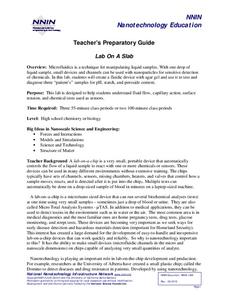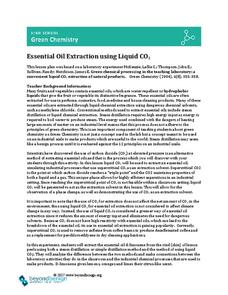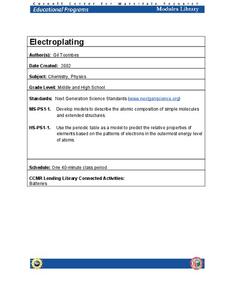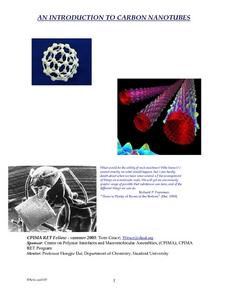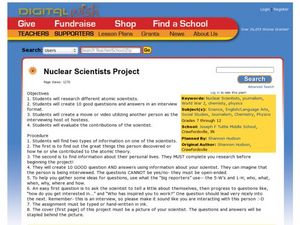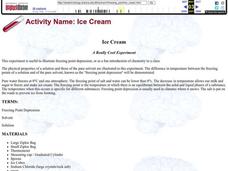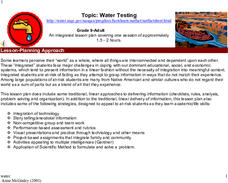Kenan Fellows
Half-Life
Scholars shake their way to understanding half-life with the help of candy. They observe and record which side candy lands on to graph the exponential decay in the fifth lesson of seven integrating chemistry and algebra. Combining...
Kenan Fellows
Using Water Chemistry as an Indicator of Stream Health
Will this water source support life? Small groups test the chemistry of the water drawn from two different sources. They then compare the collected data to acceptable levels to draw conclusions about the health of the source. The...
Curated OER
The Chemistry of Bigger Bubbles
Fourth graders explore properties of bubbles. In this instructional activity about bubbles, 4th graders perform an experiment. Students analyze the properties of bubble making substances and surface tension. Students create a square...
Royal Society of Chemistry
The 400m Event—Chemistry and Sport
How do Olympic runners succeed in physically demanding events like the 400-meter dash? Physiology scholars explore the relationship between acids, bases, and the muscular system through a scenario-driven activity. The lesson focuses on...
Curated OER
Degradation and Weathering of Polymeric Materials
Students investigate issues of degradation and weathering of polymeric materials during their useful life. They evaluate photodegradable plastics and their viability as an environmental solution for litter and investigate the qualitative...
National Nanotechnology Infrastructure Network
Lab On A Slab
Capillary action is the frugal chemist's dream ... the less liquid used, the more tests they can run! Learners experiment with the best design to maximize the benefits of capillary action. Using a liquid sample, they design a capillary...
Beyond Benign
Essential Oil Extraction Using Liquid CO2
When life hands you lemons ... experiment on them! Green chemistry gurus compare extraction methods for essential oils through a lab activity. Lab groups use traditional distillation and liquid carbon dioxide extraction...
NOAA
Ocean Layers I
How is it possible for ocean water to have layers? The sixth installment of a 23-part NOAA Enrichment in Marine sciences and Oceanography (NEMO) program investigates factors that cause different water densities to occur. Experiments...
Virginia Department of Education
Moles Lab Activities
Want my name and number? It's 6.0221415 times 10 to the 23rd, and my name is Avogadro. Providing nine different activities, experiments, and labs, this lesson keeps Avogadro relevant to your class all year long.
University of Colorado
Patterns and Fingerprints
Human fingerprint patterns are the result of layers of skin growing at different paces, thus causing the layers to pull on each other forming ridges. Here, groups of learners see how patterns and fingerprints assist scientists in a...
Curated OER
Introduction to the Periodic Table of Elements
Students explain how the elements are arranged in the periodic table. In this chemistry lesson, students determine the subatomic particles for certain elements. They research the physical and chemical properties of an element they chose.
Curated OER
Radioactive Simulations
Students simulate radioactive decay and nuclear power using an on line interactive web site. In this on line lesson plan, students monitor radioactive isotopes and record the activity of a particular element as the decay progresses. They...
Cornell University
Electroplating
Silver pennies and copper nickels are made possible by applying some chemistry. Learners use electrolysis to coat a penny with zinc sulfate and a nickel with copper sulfate. Their investigation builds an understanding of electroplating...
University of Pennsylvania
Decoding Propaganda: J’Accuse…! vs. J’Accuse…!
Reading snail mail is a great way to go back into history and to understand others' points of view. The resource, the second in a five-part unit, covers the Dreyfus Affair. Scholars, working in two different groups, read one letter and...
Curated OER
An Introduction To Carbon Nanotubes
Students engage in a study of nanotechnology that is meant to be an enrichment to the already established chemistry curriculum of high school. They are encouraged to make connections to daily life. The lesson plan includes background...
Curated OER
Physical and Chemical Changes
For this changes worksheet, students observe and record changes that occur in their every day life and classify these changes as either physical or chemical change. Students record their information in a graphic organizer.
Chicago Botanic Garden
Climate and Forest Ecosystem Services
Forests, through sequestration, capture excess carbon dioxide in our atmosphere and store it, aiding in climate change. The third installment in a four-part series on how climate impacts forests explores carbon sequestration....
Chicago Botanic Garden
Carbon, Greenhouse Gases, and Climate
Climate models mathematically represent the interactions of the atmosphere, oceans, land, sun, surface, and ice. Part two in the series of four lessons looks at the role greenhouse gases play in keeping Earth warm and has participants...
Curated OER
Photosynthesis and Respiration
Eighth graders differentiate photosynthesis and respiration. In this biology lesson, 8th graders draw a diagram explaining these two processes. They answer a quiz after the lesson.
Curated OER
Nuclear Scientists Project
Students explore nuclear scientists. In this nuclear science research instructional activity, students choose a scientist who has contributed to nuclear theory, research his/her life and accomplishments, and write a paper. Students...
Curated OER
Ice Cream
Students are shown an experiment making ice cream while discovering the freezing point depression. There are questions for students to answer after the demostration.
Curated OER
Adrenoleukodystrophy (ALD):A Case Study Using the Film
Students study the genetic disorder Adrenoleukodystrophy (ALD) by viewing the film "Lorenzo's Oil". They complete a summary of the movie and answer questions while viewing the movie. Extensions activities also included.
Curated OER
Robert Boyle's Informants
Students review and discuss the importance of Boyle's informants and how he sometimes relied on information from those with experience of the wider world to substantiate his scientific theories. They complete the worksheet, answering...
Curated OER
Water Testing
Students work together to design their own experiment to test developed hypothesis about the minerals in water. As a class, they discuss the main components of water quality and describe the chemistry behind the hardness assay. They...







